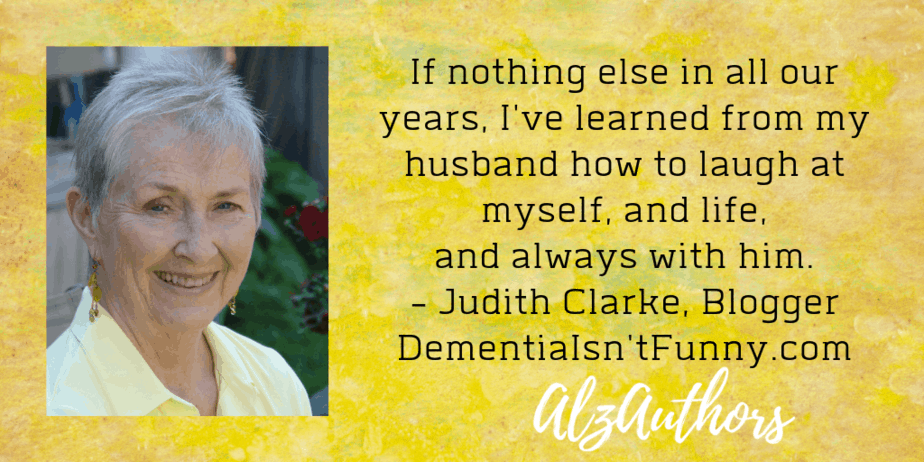By Judith Clarke, Blogger at Dementia Isn’t Funny
Laughter costs nothing and works instantly.
Take off everything but your underwear,” the nurse said. “Doctor will be in shortly.”
She handed my husband a gown and left.
Peter looked at me. “What am I supposed to do?”
“Take everything off except your underwear.”
He took his shirt off. “Is this enough?”
“No, everything but your underwear.”
As he stripped off his trousers he said, “Good thing I wore underwear today.”
I burst out laughing.
When you live with someone whose medical diagnosis includes the words “mild dementia,” you learn quickly that laughter is absolutely essential for both patient and caregiver. Alzheimer’s disease may be lurking. Laughter can’t slow the disease nor cure it, but it costs nothing and works instantly.
Decades ago I learned to laugh at my husband’s lightening quick rejoinders. Ever the life of any party, he joked about everything. Even now he laughs at himself, though much of the time he forgets why before the laughs have faded.
He was diagnosed with “mild dementia” in 2003. For the next eight years I was his caregiver, a relatively easy job, though worrisome. About six years later the doctor said, “I can no longer rule out Alzheimer’s.”
By then there was no choice but to hire help. I’d come up with the idea of therapy-dog visits for Peter and his dog Nobby. I got lucky with Bill who drove them to nursing homes in our area every Wednesday for seven years.
Peter had just gotten up when Bill arrived. Not one to be rushed, Peter sipped his coffee, nibbled his toast, and wiped (and wiped and wiped) the kitchen countertop. He will not be dissuaded from that task once he starts. Bill and I smiled.
“‘Mrs. Clarke,’” I said, “are you about finished?”
Bill chuckled. “He’s a good little ‘housewife,’ isn’t he?”
Peter muttered, “Well, someone has to do it, don’t they?”
In 2017, he seemed to get worse by the day. He’d gotten lost on a sweltering day and was found, hours later, five miles away. With that, his easy-going temperament changed, although still quick witted, a dark side had erupted like a zit on a teenager’s chin.
Mark, an additional companion was a big help too, but by year’s end, my resolve was shredded. A temporary fix, a locater watch, gave me confidence that Peter was safe walking Nobby. But it begged problems because his engineer’s mind soon figured out how to get the thing off.
Then he fell face first into a muddy ditch while walking. A policeman notified me and took me to the ambulance a block away.
Peter was already on the gurney when I climbed in behind him. He turned his battered, muddy face toward me and said, “Uh oh, now I’m in trouble.” He kept the EMTs entertained all the way to the hospital.
With the advice of our daughters I weighed the options. I’d known for months I had to do something, but I’d played ostrich. The choices were assisted living, memory care, private-care home, or 24-hour care at home. He didn’t meet the requirements for assisted living and round-the-clock care at home was a non-starter because he would hate it, as would I.
The only real choice was memory care. The day he was admitted was one of the worst days of our lives, mine because I knew what it meant, and Peter’s because he didn’t.
Anyone who has opened a door to memory care should be prepared for the stress, guilt, and pain that lies on the other side. Peter can’t articulate his feelings, but I can speak to feeling paralyzed while watching confusion engulf him.
The first time his new neurologist visited, she introduced herself, and asked, “Would you like me to call you Peter, Mr. Clarke or Dr. Clarke?”
He grinned. “Dr. Clarke sounds good.” We laughed with her.
I know it’s easier for me than for Peter. I still live in our home while he’s in a strange new environment that will never feel like home no matter how I try to make it seem so.
When I visit, I walk in and immediately begin to tidy his room. One day, in addition to the usual mess, the comforter was turned so that the ends were dragging the floor off the sides of the bed.
“Did an aide make your bed or did you?”
“Is it right or wrong?” he asked.
“It’s the wrong way ’round.”
“She made it,” he said.
I laughed like I hadn’t laughed in weeks.
If nothing else in all our years, I’ve learned from my husband how to laugh at myself, and life, and always with him.
About the Author

The writer’s block that stopped Judith Clarke cold was hidden behind dementia’s sweeping skirts. During the years she’d tried to write a novel about innocence, she admitted that her husband’s “mild dementia” diagnosis was actually Alzheimer’s disease. Real life. Not fiction.
Writing a novel, or writing anything at all, was no longer a priority. Peter was, and remains, her first priority.
Daughters Carolynn and Leslie urged their mother to start a blog, Dementia Isn’t Funny. Putting thoughts to paper helps anyone facing a challenge and Judith soon realized that her therapy was helping others —
“…You are my hero and you give me hope.” Ellen
“Such honest, insightful disclosures! You avoid the trite phrases that elicit pity and get to the heart of this very complex life we lead. It’s pure generosity and what’s more, you are gifted.” Mary Ann
“Thank you for some simple answers for a not-so-simple predicament.” Carol
“Thank you…so many [posts] were just what we’ve been going through. I appreciate your candor and humor! It’s a road no one wants to be on, but you are holding a light for some of us who are coming along behind.” Jabberwalky
“So love reading these…treasures and trials…. Such stories can only help us have empathy for those we meet day to day.” Carol
In 2016, Judith placed second in the National Society of Newspaper Columnists (NSNC) contest for blogs with under 100,000 unique visitors. Her other blog, “Wherever you go, there you are” has appeared on the Erma Bombeck Writers’ Workshop site.
Judith has written two books, Mother Tough Wrote the Book (2001) and That’s All She Wrote (2007). Both are out of print, but Mother Tough will send an autographed copy, or a boxful, upon request. Contact mothertough105@gmail.com



4 Responses
Judith,
Such truth in your words. Humor is important when living with someone with any kind of dementia. I found that true as a caregiver to my mother.
Thank you for your wise words. I know without a doubt you are helping many people through their journey with a loved one(s) with dementia. God Bless you!
Thank you, Linda. I appreciate your comment.
We have a lot in common and what you’ve written is right on. I was a caregiver to husband who had early onset Alzheimer’s and I blog at
www Alzheimercaregiveradvocate. Com.
Thanks, Susan. I’ll look for your posts.